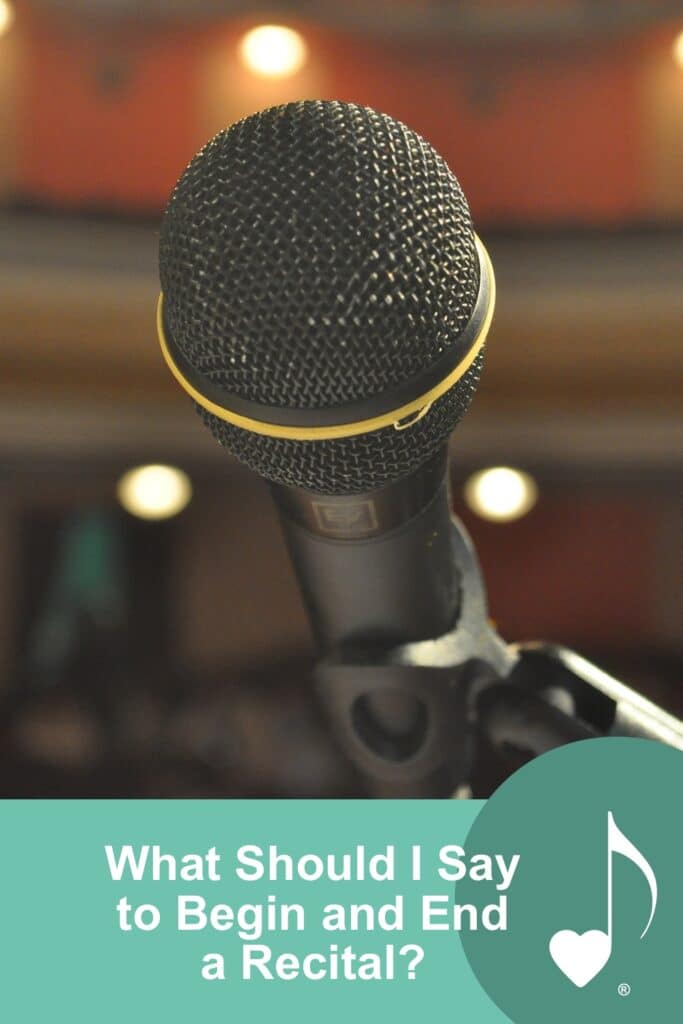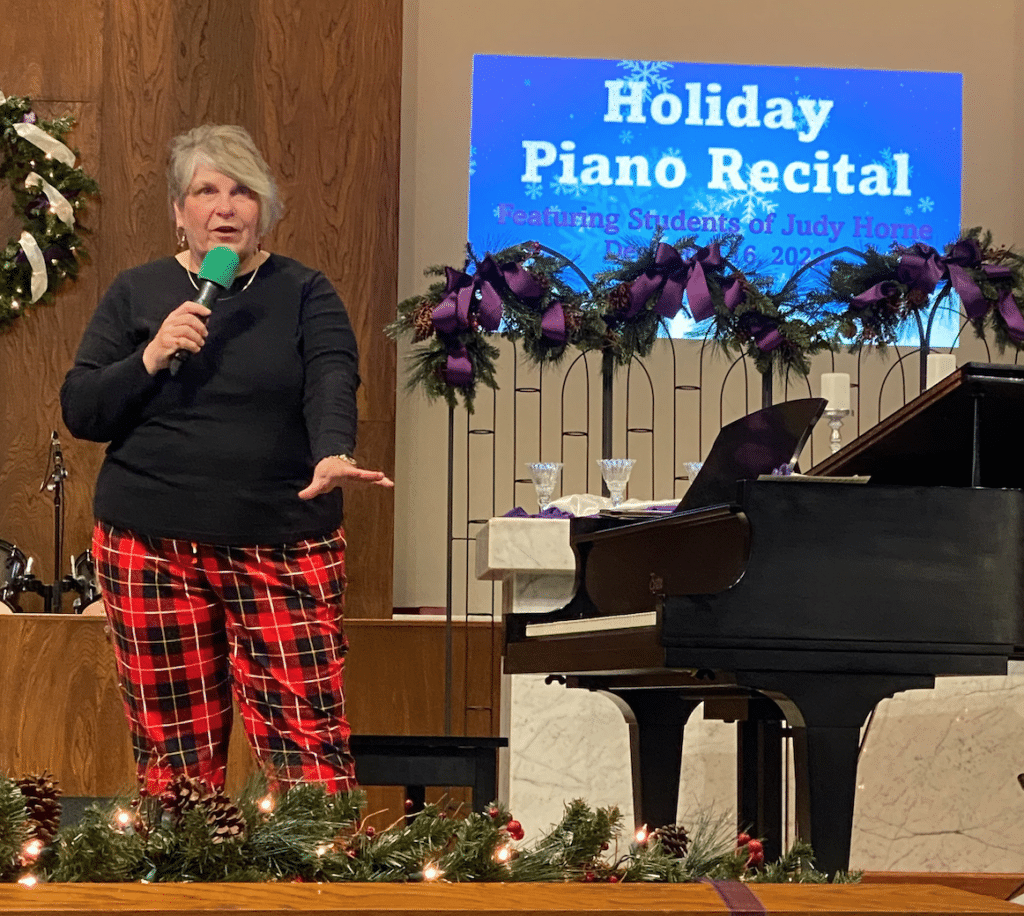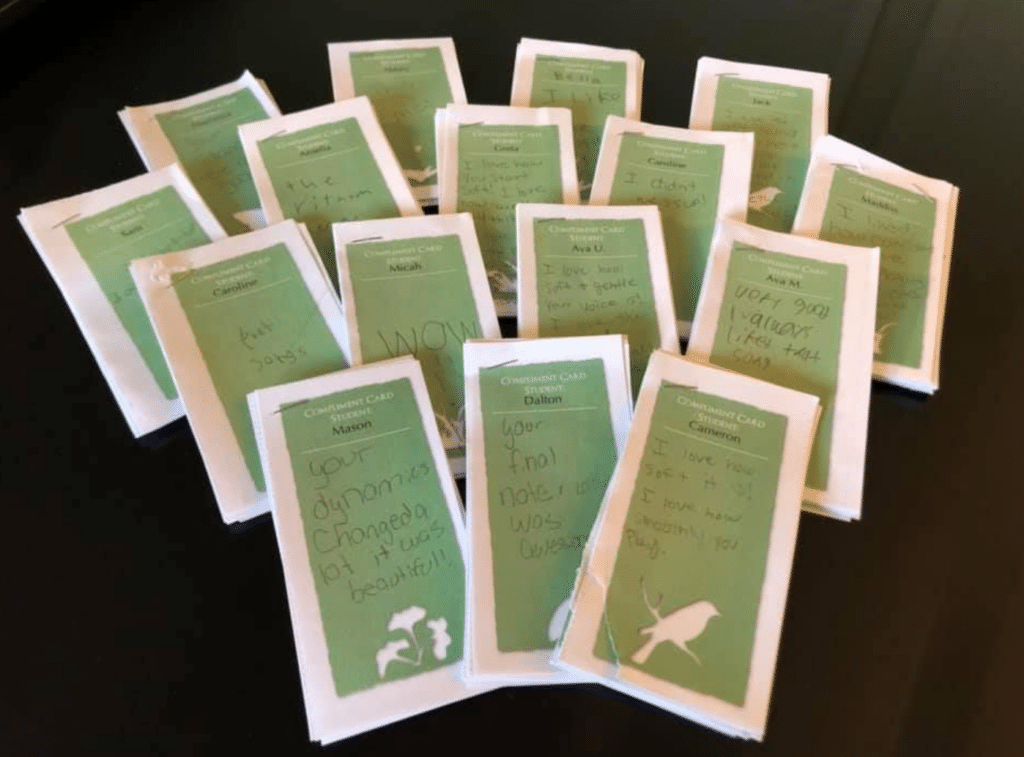
There is a lot of planning that goes into a recital – venue, repertoire, parent communication, the list goes on! But one very important aspect that can easily go unnoticed until right before the event is a welcome and ending speech. What should you say to begin and end a piano recital?
Remember that this may be the only time all year that some parents, grandparents, siblings, or potential students see you. Typically only one parent is doing the dropping off, or even the communicating that happens on a weekly basis. Allowing audience members to put a personality behind the studio their child or friend attends every week is important! It’s certainly one thing that affects your studio image. And even though that’s not the point of a recital, the professionalism you show or don’t show in this speech can impact how parents feel about and treat you.
First – A note on the length
In all, what you say at the beginning of a recital should be as short as possible – we’re talking 2 minutes or less! And the ending can be even shorter than that. Below is a list of key elements for what to say to begin and end a piano recital. I’ve also included a sample welcome and ending speech. You are more than welcome to take any or all of it to help you craft your own!
What should I say to begin a piano recital?
Introduction
Some of the points below may feel redundant. But remember: while these are all things you and your students know, your audience may not!
- Your name (however your students address you). Make sure you introduce yourself in the way you want your students to address you. For example: if my students call me “Mrs. Slyter”, but I introduce myself as “Amanda” on stage, parents are going to refer to me as “Amanda” in conversations about piano. If you want students to address you a particular way, refer to yourself that way during the recital.
- The name of your studio. There are likely grandparents, cousins, or friends who are in the audience. They may not have ever heard your studio name before. If they are interested in taking lessons after the recital, make sure they know the name of your studio!
- The recital theme (or season). If the recital has a specific theme, let the audience know. Even if it’s stated on the program, not everyone will have one or be looking at it actively. If you don’t have a themed recital, you can still let them know what the seasonal recital is. For example: the winter recital, spring recital, etc.

Thank you to parents
When Wendy and I were talking about what to say to begin and end a piano recital, she brought up a wonderful point from marketer Donald Miller: you are not the hero, your customer is the hero. In this case, your customer is the piano parent. Take time during the recital to thank parents!
Thank them for investing in their child’s music education, yes. But also for bringing their student to lessons, making them practice (even if it’s not as often as we’d like!), and for following through on a commitment that takes time and energy out of their own busy schedule. We only spend 30 minutes a week with their child. There’s a lot riding on their commitment to lessons, and recognizing how much they had to do with this milestone for their student is important.
Thank you to students
Let your students know that you’re proud of them! There are hours of practice, hard work, mistakes, and hurdles that are overcome between assigning a piece and playing it in front of an audience. Letting your students know that not only are you proud of their hard work, but also of them, is important.
Remember that it is challenging to get up in front of a room full of people you don’t know. But sometimes, it’s even more difficult to play in front of people you do know. Your family, who has heard you practice this piece daily for weeks, will absolutely know if you’ve played a wrong note, or skipped a measure. There is a real vulnerability in performing, and letting students know that you see and appreciate their bravery lets them know that you see them.
Expectations
This part is absolutely crucial for having a recital that you feel was successful. Make sure the audience knows what you expect of them. We all know recital etiquette as teachers – but the audience may not! Do you want people to hold applause between each student? Tell them that! Is there another group coming in and everyone has to be out by 6pm? Make sure they know. Here are three things I always include – this is just to get your own expectation train rolling!
- Stay to the end of the recital. It drives me nuts to see families leave in the middle of a recital just because their kid is finished. I completely understand that sometimes there are multiple events on one night – in that case, I always work something out. Life happens! But if you’re the kid at the end playing for a half-full auditorium, it’s discouraging. I always include this line: “The students at the end of the recital worked just as hard to prepare their pieces as the students at the beginning. I would ask that you remain until the end of the program to make sure all musicians experience the full audience they deserve”. Problem solved! Parents know I expect this, and communicate with me beforehand if that can’t happen. Many times, the real “show stopper” pieces are towards the end of the recital. It’s also important to me that students see peers who are more advanced than they are, as it’s very inspiring for them!
- Compliment Cards. If you don’t already do compliment cards, you absolutely should! They’re included with all of the ComposeCreate templates, and are my students’ favorite aspect of recitals (and one of mine!). If you aren’t familiar with the concept, you can read all about it here. I tell parents how to use them (see verbiage in the sample speech below), and it keeps everyone engaged. (Note: For those wondering, I always have my husband, sister, and parents write a card for every student. That way, every student is guaranteed at least four!)
- Anything special about your recital (including space to record). For example, I always have my students go up one after another. As soon as student A bows, student B walks up on stage to introduce themselves and their piece. Parents may not remember we do things this way, so I remind them to watch the program so they know when their student is performing. I have two chairs on the front row marked “reserved for parent recording”, so one parent can be getting set up while another is recording. Because parents know this ahead of time, I’ve never had any issues or complaints! If there’s something like this that would be helpful for parents, let them know in this section.

Sample Speech:
Hi everyone, and welcome to the [your studio name] [theme] Recital (e.g. Etude Studio’s Modern Composers Recital). My name is [your name], and I am so grateful to all of you for coming out and spending your evening with us as we share some beautiful music with you all.
If you were here last year, you may recognize the returning students, as well as some new faces that we’re so excited to welcome. All of these students have worked hard this year.
I want to say thank you to parents for investing in music as part of your child’s life. It is a time, energy, and resource commitment to bring your child to lessons, to make them practice, and to do so faithfully every week. I only see your students once a week – so the part your play in their progress from one recital to the next is very big, and I am thankful for the work you have put in as parents.
Thank you to these wonderful students for working hard, practicing, getting dressed up on a weeknight, and for being brave in sharing your music and abilities with family and friends. I am so proud of each of you, and I am so excited to listen to you tonight.
Before we begin, I’d like to remind you of just a couple things:
1. The students at the end of the recital worked just as hard to prepare their pieces as the students at the beginning, so I would ask that you remain until the end of the program to make sure all of the musicians experience the full audience they deserve.
2. Students will be coming up one after another to perform, so if you’re recording this, make sure you keep an eye out for when your student is playing. I have two chairs in the front row with a “reserved for parent recording sign” if you would like to use one while your child is performing.
3. You’ll find cards with students names on them, and pens under your chair. These are compliment cards. If you feel so inclined, please write what you loved about each performance and we’ll read through them in the next lesson. Make sure to include the students name at the top, which can be found in your program. It could be their confidence, posture, musicality – anything that stands out to you as being exceptional. It can be vulnerable to share muisc with people, and it’s encouraging to get feedback.
With that, we’ll get started with our first performer, [student name].
What should I say to end a piano recital?
This should be even shorter than what you said to begin the recital. Parents saw their child perform, they waited for all of the other students, and they’re ready to go! A quick thank you for showing up, acknowleding students, and last minute instructions are all that’s needed. (ex: where to drop off compliment cards, instructions for refreshments, etc.)
Sample Speech:
That concludes the [recital name]! Students, thank you so much for sharing your beautiful performances with us. Parents, family, and friends -thank you for spending your evening with us.
[Insert any special information parents need to know before leaving] Example: Please remember to drop your compliment cards into the baskets by the doors.
[If serving refreshments, give instructions here. Include whether people are invited to linger for awhile, or whether people need to leave for another group]
Example: We have refreshments in the back, and you’re all welcome to eat and hang out for awhile. We do have a few gluten-free options, which are labeled for those of you who are gluten intolerant.
Thank you!
Every teacher and recital looks different – but I hope this gives you ideas for knowing what to say to begin and end a piano recital! Let us know in the comments – is there anything we missed? What do you always include in your own recital speeches?
Want to be notified when we have new idea shares and webinars?
If you are a piano teacher and want to know when articles like these get published, please join our email newsletter! We send out weekly newsletters with articles, new music notifications, free webinar opportunities and free teaching resources! We’d love to have you a part of the ComposeCreate community.

At the end of the recital, all students stand for one more round of applause. Then I ask the students to give a round of applause to that person who says, “Don’t forget to practice.” “Don’t forget to practice your new song.” “Don’t forget to practice slowly.” etc.
Excellent and thoughtful. Thank you, Wendy!!
Spring Recital is when I give out awards. Every one gets one of some sort. Senior also honored if they do not wish to do an entire senior recital. Discuss summer lessons briefly too so that they WANT to keep the “YAY” going through those months and be ready for fall events.
Thank you Wendy for this lovely advice about recitals. Your input is always enlightening, reassuring and informative. Piano teachers can certainly benefit by your input, energy and sincerity.
At the end of the spring recital, I call up each student in program order and tell the audience about them and their musical achievements for the year, give them their guild pin and certificates, then a personal gift, often humorous. They each stay on stage, then we take a final photo. It’s always a lot of fun and exciting, and the kids feel proud of themselves.
I always acknowledge graduating seniors at the end of the recital. I highlight their high school career, how many years they took lessons and something I will always remember about them. I then present each senior with a presentation bouquet (a single rose with baby’s breath, greenery, and a pretty bow – boys get one, too). So my conclusion to the recital takes a little longer. But families have really looked forward to this time of special recognition.
Wonderful ideas on what to say at a recital. They are spot on. One thing I will add is to call all the students up for a final group photo after the concluding remarks. Everyone loves these group photos and I have saved all these group photos through the years. Parents love taking them too. Remember to do this before dismissing everyone to the refreshments because after the snacks, not everyone looks presentable!
Thanks, Wendy. This is really helpful!!
I always tell where the drinking fountain & restrooms are.
I have a question. How long do you think recitals should be? Is it better to mix ability levels in a recital or have an advanced recital and a more beginning recital?
I also have a comment: Love the beginning info you gave about staying to the end and I’m excited to try the complement cards! For my last recital I had a couple of students doing a very impressive duet that required Hand crossing and a few othe tricky, unusual things. The parents wanted the audience to be able to see their hands so one of the dads set up a big screen and a camera on the keyboard. He did video of the whole recital and put it on a YouTube channel so that far away grandparents could watch. It was a huge hit! Everyone wants him to do it again.
Regarding taking photos and videos during the recital, perhaps should say something about digital privacy and sharing of photos and videos. Usually parents would only take photos of their performing child but in an ensemble performance or group photo setting, this may be tricky. So we normally say -take as many photos as you like during the recital of your child. However if you happen to take photos /videos of your child with others and would like to share them on any social media platform, we need to be mindful of privacy issues and obtain consent from the relevant parent before sharing.